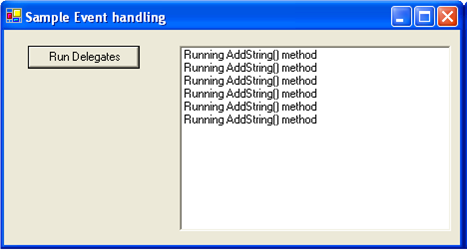What is a delegate?
The Delegate is the class that can hold a reference to a method or a function. The Delegate class has a signature and it can only reference to those methods whose signature is compliant with the class. The Delegates are type-safe functions pointers or callbacks.
The sample code is shown below which shows an example of how to implement delegates.
Public Class FrmDelegates
Inherits System.Windows.Forms.Form
Public Delegate Sub DelegateAddString()
Private Sub FrmDelegates_Load(ByVal sender As System.Object, ByVal e As System.EventArgs) Handles MyBase.Load
End Sub
Private Sub AddString()
lstDelegates.Items.Add("Running AddString() method") End Sub
Private Sub cmdDelegates_Click(ByVal sender As System.Object, ByVal e As System.EventArgs) Handles cmdDelegates. Click
Dim objDelegateAddString As DelegateAddString objDelegateAddString = AddressOf AddString objDelegateAddString.Invoke()
End Sub
End Class
In the above code there is a method called "AddString()" that adds a string to a listbox. You can also view a delegate declared as:-
Public Delegate Sub DelegateAddString()
This delegate signature is compatible with all the "AddString" method. When I say compatibility that means that there return types and passing parameter types are similar. After in command click of the button object of the Delegate is created and the method pointer is received from "AddressOf" keyword. Then by using "Invoke" method the method is invoked.

Figure:-Delegate in Action